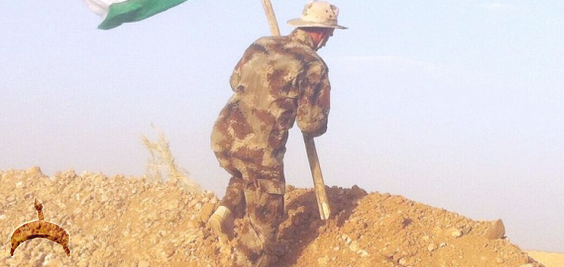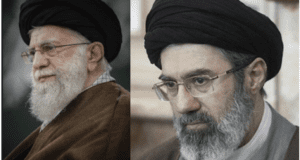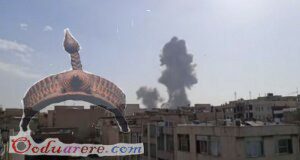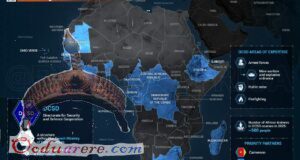by Ramin Mazaheri
As Assad-backed troops enter Afrin to fight Turkish invaders, the Syrian conflict has entered its decisive crossroads:
Will Northern Syria cooperate with Damascus, or not? This is the key to Syrian peace and territorial unity.
It’s also the question which will make or break claims that a Northern Syrian enclave which refuses to help expel uninvited Americans can somehow be a “leftist project”.
(I say it is a leftist project…IF they return to full cooperation with the Syrian government. I will detail my analysis of the political structure of “Rojava” in an upcoming article – this article only deals with immediate political concerns.)
No question can be answered, however, until I clarify some key facts about Northern Syria. Indeed, reporting about Northern Syria in the West is rife with the most fundamental errors, and the most egregiously false claims.
Firstly, the Kurds in Syria have only ever asked for autonomy, not independence.
People assume all Kurds are like Iraqi Kurds – separatists – but the Kurds in Syria want to stay within the Syrian state. This disavowal of independence is an undisputed, long-standing (if underreported) fact. Indeed, the arrival of pro-government forces in Afrin was met with celebrations – the “Arab Socialist Baath Party” is a nationalist one, it seems to have been forgotten. The fact that such celebrations could possibly raise some eyebrows only shows how terrible the West’s mainstream reporting is in Syria.
The second most important point is this: “Rojava”, “Syrian Kurdistan”, “Northern Syria” or the “Democratic Federation of Northern Syria” – whatever it is called – is among the most interesting (and newest) leftist projects in the world today.
For that reason alone, nobody is reporting on it honestly.
After all, the Western mainstream media has no governmental or private mandate to support the 99%…much less in a Muslim country…still less in an anti-Zionist country like Syria!
Rojava’s governmental culture is based around ethnic equality, collective unity, local emancipation and undoubtedly socialist-and-not-capitalist inspired democratic & economic ideals. Therefore…the capitalist-imperialist West totally ignores all of that and solely focuses on identity politics: thus, it’s always reported as just “the Kurds”.
That leads to the third important issue: foolishly lumping all the Kurds across Southwest Asia together, thereby assuming that there are no regional differences: For Western media it is as if Kurds walk around all day in a special “Kurdish daze”, so enamored with being Kurdish that the countries and local neighborhoods where they live have absolutely no effect on them or their worldview. Their “Kurdishness” is all-consuming, it seems! The theory underpinning this is identity politics: if you are Kurdish, then you must all think alike.
So it makes no difference if you grew up/lived in Saddam’s Iraq, modern Iran, Baathist Syria, or Istanbul: You are a Kurd and – as a Kurd – you can only possibly see things via the lens of your Kurdishness. But only the West proffers this absurd, one-dimensional view of the Kurds – not the Middle Easterners who live alongside them.
A fourth problem – an even larger one for those in Syria – is that the Kurds in Syria are not even “Kurds”!
What I mean is: Kurds are around ½ of the population of Northern Syria, but only compose around 1/3rd in some of the biggest areas of Rojava, such as Membij. There are Assyrians and Chaldeans – they are Christian. There are Sunni Arabs. There are Turkmen, who are not allied to Turkey and are Syrian patriots despite their name. There are Circassians, Armenians, Yazidis, Chechens and others. Hard as it is for non-Muslims to believe: All these people like each other, live & work together, intermarry and have done so for more than a millennia. You cannot even say that all the fighters in this area are Kurds, either, because the Syrian Democratic Forces forces – who helped rout ISIL – are majority non-Kurd.
But they are all Syrian – and they want it to stay that way.
This IS the case…even though Kurds in Iraq aimed for independence…and despite the Western anti-Assad propaganda.
Clearly, a major overhaul on the idea of “Kurd” is needed for many….
The Kurdish ‘Bad Century’ is relative to where they live
Anyone can have a bad century and finish as winners…look at the Chicago Cubs.
So in Northern Syria the “Kurds” are not even Kurdish nearly half the time, LOL, but let’s be like the West and look at the “Kurds” across their 4 main nations.
If we accept that “Kurdishness” is not all-consuming , we can see how the experiences of “Kurds” in Iraq (which also compose Assyrians, Chaldeans, Turkmen, etc.) – who lived under Saddam Hussein’s wars, were massacred by the anti-Iranian MKO homicidal cult, lived in a country forced to endure material shortages caused by US sanctions from 1990-2003, and who are enduring US invasion and occupation – are fundamentally different than the experiences of “Kurds” in Syria…where these things did not happen.
The experience of “Kurds” in Syria – which is bordered by the menacing, illegitimate state of Israel, which had a different political conception & practice of Baathism than Iraq (which provoked more enmity than cooperation between the two since 1966), which was invaded not by a “coalition of the willing” but radical terrorists, which is on the cusp of benefitting from the extraordinary national unity which can only be created by victoriously defeating foreign invaders – are fundamentally different than the experiences of “Kurds” in Iraq.
“Kurdishness” in Turkey is an vastly larger issue than Syria, because there are vastly more of them than in anywhere else.
“Kurdishness” in Iran is totally different than in any of the four primary Kurdish countries: they are more accepted there than any other country.
This is a result of the acceptance promoted by Iran’s modern, popular revolution of 1979 (by definition, you can’t have a “modern, popular revolution” based on racism/ethnic superiority). Indeed, Iran’s definitive cultural “female Iran-Iraq war experience” was the best-selling, award-winning story told by a Kurdish immigrant from Iraq to Iran – in the book“Da”, which means “mother” (not in Farsi). Such a thing could never happen in Turkey, obviously, nor Arab nationalist Syria and Iraq. This modern acceptance is why Iran is the only nation of the four where there is no chance of fomenting a Kurdish uprising in Iran: being Iranian and Kurdish is not any sort of contradiction – they are incorporated in the national self-conception about as much as any numeric minority can reasonably be, as the success of “Da” illustrates. And for this reason – which is called (Iranian Islamic socialist) “modern democracy” – there is no chance of any sort of a “Kurdish uprising” in Iran. Even amid this ongoing historical era of Kurdish militancy across the entire region, the PJAK Party (Iranian Kurdish separatists) gave up armed operations in Iran in 2011: it’s useless – Iran is different, and on the Kurdish question as well. Israel could spend a zillion usuriously-gained dollars on such a project and it would get nowhere…which is why they spend their time in the southeast (in Baluchestan with Jundallah).
And, to repeat, because this is so important: The people of Northern Syria have never, ever said they want anything but autonomy within Syria. This proves that Syrian “Kurds” are not Iraqi “Kurds”, where Barzani and their bid for independence have been neutralised…much to the dismay of the US & Israel.
An often ignored (or not known) point is that Iraqi “Kurds” had been wooed (or led astray) by the US for two decades via preferential economic, political, cultural and immigration policies. The US paid for a lot of goodwill over many years. In Syria – LOL, not at all. So, Syrian “Kurds” have not come into contact with the American ideology anywhere as much…and their ideology is necessarily different (despite the overpowering Kurdish daze they walk around in, LOL!)
Only by ignoring these realities can one assume the “Kurds” of both regions share the same political outlook in February 2018.
So, I hope we are bit less konfused on who the “Kurds” really are.
Now, because of the leftist nature of northern Syria, we must de-konfuse our notions of their political ideology.
But I’m going to postpone that to part two – let’s talk immediate politics.
A very interesting leftist political project…but not if they ally with the US
It was with great alarm that greeted the recent US declaration that they will keep 2,000 troops in Northern Syria – that news turned off many to the possibility that northern Syria could possibly be leftist.
And rightly so, but Washington’s plans are simply their desire – there has been no official political deal: Rojavan leaders insist their cooperation with the US is strictly military to fight ISIL. Indeed, they have grown up in Syria, which has been attacked by Israel…but now they are going to be allies?
Certainly, the downfall of Barzani in Iraq is a blow to US/Israeli imperialism – so…of course they are refocusing to Northern Syria. But that doesn’t mean they will get what they want!
Certainly, Northern Syria cannot allow a military base inside its borders. There can be no “Syrian Guantanamo” to permanently menace a newly-liberated Syria, like in Cuba.
Let’s keep a couple war realities in mind: It’s not as if Northern Syrians could have stopped the US from planting soldiers and using an airstrip – there has been a huge war, after all, with a well-heeled army called ISIL to stop.
Let’s also remember that the Northern Syrians work with everybody to fight ISIL in Northern Syria: Russia, the US, Damascus, Iran, Hezbollah – everyone but Turkey. (Obviously, the US both fights terrorism and supports it.)
Rojavans…it may be now or never to fight for Syrian unity
The invasion by Turkey means Northern Syrians have now reached the point of no return: to work with Turkey (and thus the US) is to betray the Syrian people which Rojavans have always claimed to want to be.
Therefore, Syria is on the verge of peace and total victory…or major civil war: It will be decided by inter-Syrian diplomacy. Negotiations have been ongoing between the two areas for years, of course, and they are no doubt in overdrive right now.
The fundamental problem is this: Damascus has always rejected the idea of a federated state and autonomy for Northern Syria. Northern Syria has held their ground militarily, and Damascus has been too occupied with ISIL to demand cooperation…but it’s February 2018, and here we are.
So what will Damascus do, and what will Rojava do?
I am not a Syrian, and thus my opinion should be worth very little – the future of Syria is only for Syrians to decide – but to me it looks like this:
Rojavans may view siding with Damascus as a risk regarding the re-installation of some Arab Nationalist policies they dislike (Rojava has 3 official languages for a reason, for example)…but siding with the Americans is a guarantee of leftist betrayal, a guarantee of a failure and a guarantee of regional bloodshed for decades.
Maybe Rojava can expel ISIL on their own, but they cannot expel the US and Turkey without Damascus…and they must be expelled. How can these troops stay if Damascus and Rojavans cooperate? They cannot, whatever the Pentagon wants.
Therefore, at some point – a point quite soon – Rojavans will need to openly embrace Damascus, in the name of Syrian unity and in the realization of issues larger than their own interests and sacrifices.
On the other side, there is nothing stopping Damascus from making concessions to win over Rojava…and yet, one easily sees the government’s hesitance: Making major changes to Syria’s political structure seems to require the democratic approval of the entire nation via vote. The granting of wholesale structural changes for one-third of the country during wartime appears to lack democratic legitimacy.
Rojava is where most of Syria’s oil is located. Certainly, those funds cannot be made the complete “autonomous” property of Rojavans. One easily sees how “granting autonomy” is a major question that goes beyond just the decades-long elevation of Arab culture over the culture of Turkmen, Chaldeans, Kurds, etc.….
Of course, it should not be surprising that Assad’s view of Rojava never gets an airing…but given Rojava’s leftist bonafides, nobody ever talks about them at all either. “Keep ‘em konfused with just ‘Kurds’” is the media line….
To sum up my view of the immediate political situation: Unity requires faith – Northern Syrians need to trust their fellow citizens that their success has earned them good faith credit in Syria’s common future.
And, finally, what choice does Rojava have? Turkey will never accept them (this is the pretext for their invasion), nor Damascus, nor Iraq. The only ones who will are the US and Israel…and that is leftist?!?!
No…this is why I predict a reconciliation. The failure of Syrian-Syrian diplomacy at this juncture is…civil war.
And who wants that in Syria?
In an upcoming second article I will examine what is the “leftist ideology” of Rojava, and how these ideas might interact with Arab Socialist Baathism in a unified, free, victorious state of Syria.
Ramin Mazaheri is the chief correspondent in Paris for PressTV and has lived in France since 2009. He has been a daily newspaper reporter in the US, and has reported from Iran, Cuba, Egypt, Tunisia, South Korea and elsewhere. His work has appeared in various journals, magazines and websites, as well as on radio and television. He can be reached on Facebook.
 Ọmọ Oòduà Naija Gist | News From Nigeria | Entertainment gist Nigeria|Networking|News.. Visit for Nigeria breaking news , Nigerian Movies , Naija music , Jobs In Nigeria , Naija News , Nollywood, Gist and more
Ọmọ Oòduà Naija Gist | News From Nigeria | Entertainment gist Nigeria|Networking|News.. Visit for Nigeria breaking news , Nigerian Movies , Naija music , Jobs In Nigeria , Naija News , Nollywood, Gist and more









